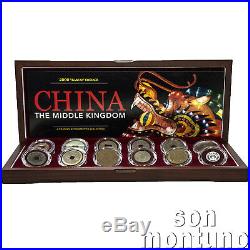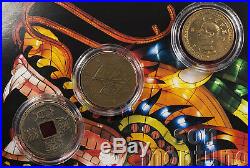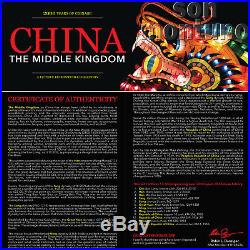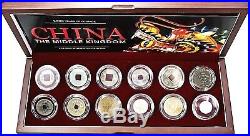

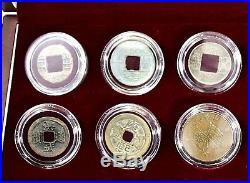
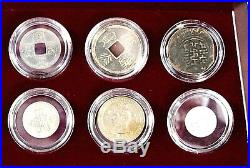
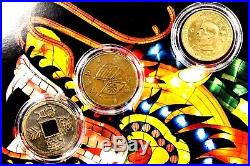
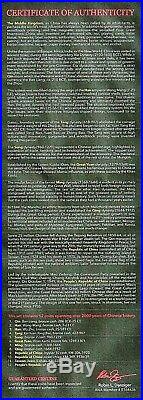
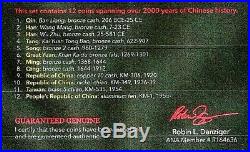

China: The Middle Kingdom. A 12-Piece Retrospective Collection Beautiful Boxed Set. The Middle Kingdom, as China has always been called by its inhabitants, is perhaps the worlds most influential civilization. While it has both expanded and fractured a number of times since then, it has been unified more often than not. This is due in part to a culture and system of government established by the pre-Common Era dynasties, which imposed a strict hierarchy among various ancestral cults and standardized the writing script, weights, and measures. The first emperor of one of these early dynasties, the Qinfrom which the Western word China derivesestablished the first unified currency, the Ban Liang, ca. 210 BCE, appropriating a design first introduced by the Zhou. This chaotic system wreaked havoc on the Chinese economy and ultimately doomed the Han, the great dynasty that had invented paper. The situation improved under the emperor Guang Wu (25-56 CE), who simplified the monetary system; his Wu Zhu issues, with their distinctive hourglass-shaped design, continued to be issued for centuries. Gaozu, founding emperor of the Tang dynasty (618-907) abolished the coinage based on a weight of Wu Zhu i. Five zhu and began to cast Kai Yuan Tong Bao ca. The Tang was an era of high culture and innovation; gunpowder and woodblock printing were invented during this period. The copper cash coin became the currency for the monetization of the economy. The medieval dynasty fell to the same power that took most of the rest of Asia: the Mongols. Marco Polo made his famous journey to China at this time. The coinage showed Islamic influence, as with these issues by the Khan Kaidu. The last of the ethic Han dynasties, the Ming comprised what some historians hail as one of the greatest eras of orderly government and social stability in human history. Such focus on stability meant that the cash coins looked much the same as they had a thousand years earlier. During the Great Qing period, China experienced a marked growth in size, population, and economic might that foreshadowed its 21st century prominence. Its territorial extent included all of modern-day China, as well as Taiwan, Mongolia, Bhutan, and parts of Myanmar, Kyrgyzstan, Tajikistan, Pakistan, and Russia. Throughout, the design of the cash coin did not much change. Some 25 million Chinese fell during the Taiping Rebellion of 1850-64; in all of human history, only World War II had a higher death toll. The Qin managed to survive this civil war with the ironically-named Heavenly Kingdom of Peace, but when the 19th century gave way to the 20th, the monarchy was on its last legs. Led by its first president, Sun Yat-sen, the Republic of China controlled all of China from 1912 until 1949, when it was forced to repair to the outlaying island of Taiwan. From 1928 until his death in 1975, its leader was Chiang Kai-shek. Early issues, such as this ten cash, show two crossed flags: the five-stripe flag of the Republic crossed with the national emblem. Later Taiwanese issues feature the portrait of Sun Yat-sen. Led by the indefatigable Mao Zedong, the Communist Party prevailed in the Chinese Civil War, chasing Chaing Kai-shek and his disciples off the mainland entirely. On October 1, 1949, the Peoples Republic of China was established. The government turned its back on thousands of years of proud tradition. His policies were failures. Between the Great Leap Forward, the Great Cultural Revolution, and the Great Famine, some 60 million Chinese died as a result of Maos botched programs. After Maos death in 1976, the PRC instituted a number of economic reforms that have contributed to its re-emergence as a world power in the 21st century. The design of this one fen coin, struck in aluminum, has not changed since 1955. The box set is accompanied with a story card, certificate of authenticity, and a black gift box. Over 22,000 positive feedbacks. The item “China The Middle Kingdom. A 12-Piece Retrospective Coin Collection Boxed Set” is in sale since Thursday, December 14, 2017. This item is in the category “Coins & Paper Money\Coins\ World\Collections, Lots”. The seller is “caz-10″ and is located in Diamondhead, Mississippi. This item can be shipped to United States, Canada, United Kingdom, Denmark, Romania, Slovakia, Bulgaria, Czech republic, Finland, Hungary, Latvia, Lithuania, Malta, Estonia, Australia, Greece, Portugal, Cyprus, Slovenia, Japan, Sweden, Indonesia, Belgium, France, Hong Kong, Ireland, Netherlands, Poland, Spain, Italy, Germany, Austria, Bahamas, Norway, Saudi arabia, United arab emirates, Bahrain, Croatia, Malaysia, Chile, Colombia, Costa rica, Dominican republic, Panama, Trinidad and tobago, Guatemala, El salvador, Honduras, Jamaica, Viet nam, Uruguay, South Korea, Mexico, New Zealand, Philippines, Singapore, Aruba, Bangladesh, Bolivia, Ecuador, Egypt, Gibraltar, Iceland, Jordan, Cayman islands, Sri lanka, Luxembourg, Martinique, Nicaragua, Oman, Peru, Pakistan, Paraguay.
- Circulated/Uncirculated: Circulated
- Unit of Sale: Collection
- China: The Middle Kingdom. A 12-Piece: Retrospective Boxed Coin Set
- Country/Region of Manufacture: China
- Certification: Uncertified



